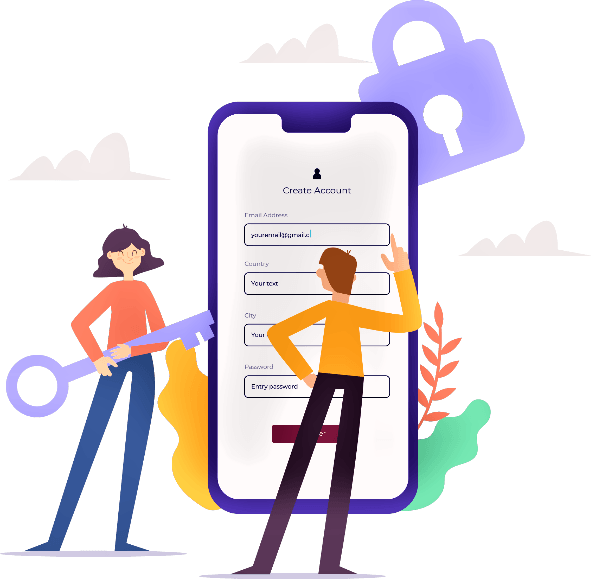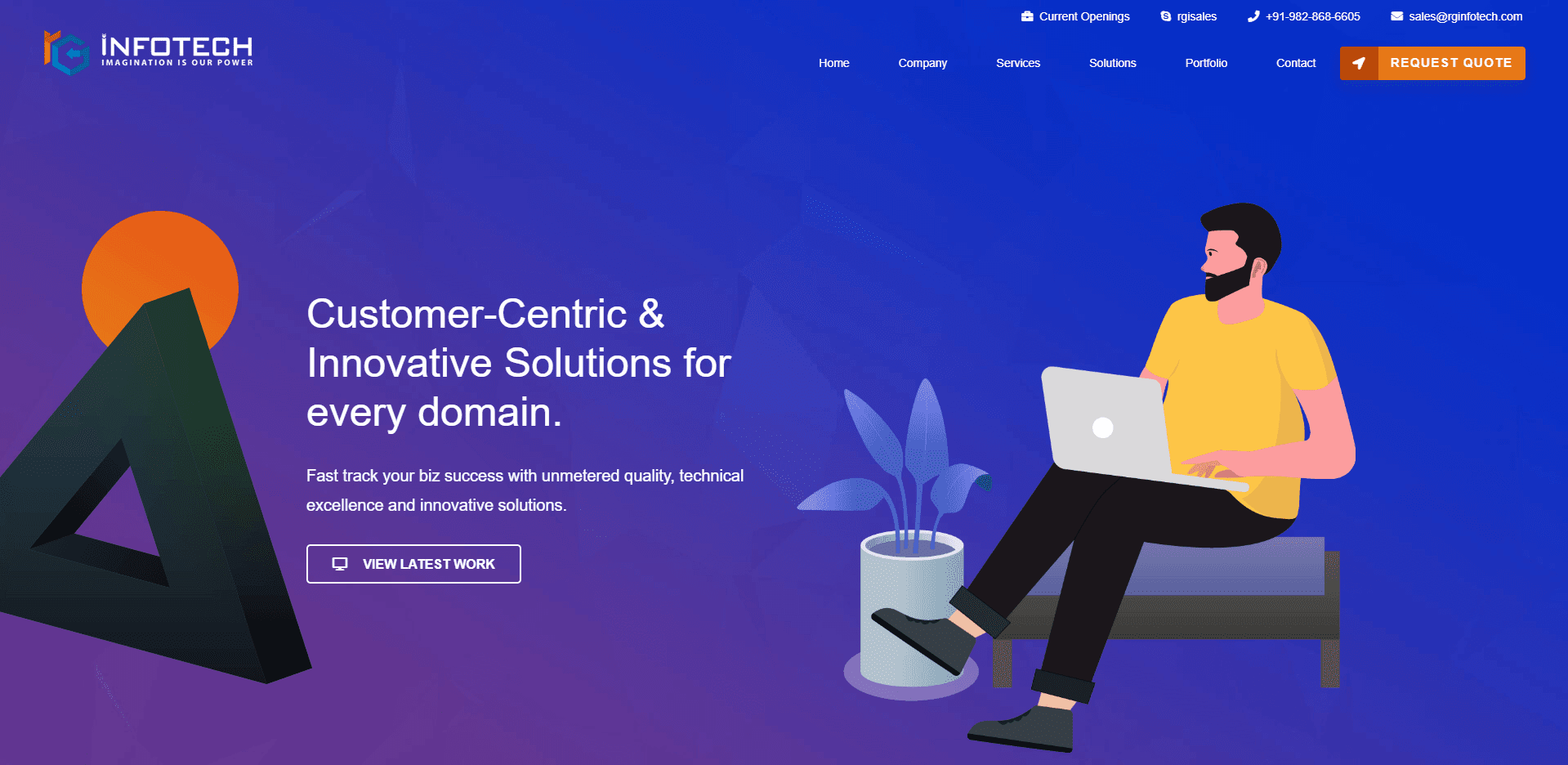Top 10 Must-Have Features for Doctor Appointment Booking App Development in 2025

Summary:
The development of doctor appointment booking applications has become essential for clinics, hospitals, and startups with a background or intention to shift to digital health care provision. In this blog, the top 10 must-have features in your healthcare app range from real-time scheduling to telemedicine integration, AI recommendations, and ensuring data security. Find out how these features can help you create a future-ready online doctor consultation app that stands apart in the year 2025 and how RG Infotech can turn this into a powerful healthcare solution.
In the digital world, people want convenience in all aspects of their lives, including healthcare. After the COVID-19 pandemic, the importance of digital transformation in medicine has accelerated the pace of virtual meetings. With the need to reach out to medical professionals instantly, doctor appointment booking app development has become one of the most in-demand solutions within the healthcare industry.
According to a survey conducted by Verified Market Reports, the doctor appointment app market revenue in India / the USA / UAE was valued at $15 billion in 2025 and is projected to reach 4.5 billion by 2033, growing at a CAGR of 15.5% from 2026 to 2033.
So, what makes a great healthcare app stand out? Let’s explore the top 10 must-have features of doctor appointment apps in 2025 that can help you deliver seamless and trusted experiences for both patients and doctors. If you want a detailed knowledge of this, then read our recent blog on a complete guide to healthcare app development to learn in-depth about this.
Build a Future in Digital Healthcare with RG Infotech
We are a leading telemedicine app development company with 10+ years of experience in connecting patients and doctors through technology.
Be it telemedicine integration, EHR systems, or AI-driven healthcare app features, we will work on everything you need.
Top 10 Features for a Doctor Appointment Booking App Development
Are you planning to enter the very competitive digital health market? Building a successful doctor appointment booking app development project involves much more than just a simple scheduling tool.
However, to resonate with users and provide undeniable value, your application should be built on the best healthcare app features. This in-depth guide breaks down the core functionalities that will enrich your application, making it the indisputable market leader.
1. Patient Registration
The first interaction with your app sets the tone for the user experience. Patient registration should not take more than a few seconds, using either phone numbers, emails, or social accounts.
But beyond convenience, security is essential. Two-factor authentication, biometrics (such as Face ID or fingerprint login), and encrypted sign-in are integrated to keep data safe.
Providing easy onboarding for doctors, such as license verification and credential uploading, will foster a level of trust among patients. No longer would patients have to wait in crowded clinics or make multiple phone calls to schedule an appointment.
With clinic management software, patients today can have quick, safe, and convenient access to medical care from the comfort of their own homes.
2. Telemedicine and Virtual Consultations
Telehealth nowadays has become a mainstay of modern care, not an alternative. An easy virtual experience is mandatory for the comprehensive telemedicine app features in 2025.
High-Fidelity, Encrypted Connection: The video conferencing tool needs to be designed from the ground up with HIPAA/GDPR compliance and add secured end-to-end encryption. Quality must be optimized across low and variable bandwidths.
In-Consultation Tools: Allow for screensharing to review lab results, drawing on digital anatomy diagrams, or live note-taking by the doctors.
Virtual Waiting Room: This is a dedicated digital space where the patient waits and fills out any pre-consultation forms before the doctor allows them to enter the virtual session.
3. Verified Doctor profiles
It is about building patient trust, and this requires that the platform deliver transparency and social proof.
Full Professional Profiles: More than specialization and years of experience, the profiles should include hospital affiliations, insurance plans accepted, professional publications, and even a short intro video by the doctor.
Verified Patient Feedback: Provide a mechanism to ensure that ratings and reviews are only entered by patients who have actually completed an appointment. Allow doctors to professionally respond to feedback to show engagement and accountability.
Language & Accessibility Filters: Allow users to filter doctors depending on the languages spoken or specific accessibility accommodations (such as facilities for mobility issues).
4. Seamless Electronic Health Record (EHR) Integration
It needs to act as a bridge between the patient and the digital infrastructure of the clinic.
Secure Data Exchange (APIs): Use robust, secure APIs, such as FHIR standards, to integrate with popular EHR systems like Epic and Cerner for key data on patient history, medication lists, and lab orders.
Patient-Controlled Data Hub: Provide patients with a centralized, secure dashboard through which they can access their lab results, medication history, summaries of past visits, and even share data with other specialists outside the network, with their explicit consent.
5. Multi-Channel Engagement
It also greatly reduces no-shows and better prepares patients for clinics.
Layered Notification Strategy: Send reminders at key intervals for like 48 hours to provide easy cancellation, 24 hours for confirmation prompt, and 2 hours to go prompt.
Pre-Visit Preparation Checklist: Automate a checklist of what to bring in the way of identification or insurance cards, or preparations such as fasting or bringing completed forms, according to the appointment type.
Waitlist Automation: Once a user cancels, the system automatically notifies the next person in the waitlist, filling up the slot with minimal manual intervention.
6. In-App Payment Gateway and Insurance Verification
In other words, addressing finances upfront decreases friction and enhances patient satisfaction.
Transparent Cost Estimation: Showing an estimated cost based on the information submitted by the patient before booking the appointment.
Secure Prepayment Options: Allow for secure prepayment of full consultation fees by credit card, Apple Pay, Google Pay, or other digital wallets to minimize administrative work at the clinic’s reception.
Real-Time Eligibility Check: Integrate with insurance clearinghouses for instant verification of a patient’s insurance eligibility and pre-visit benefits, minimizing claim rejections later.
If you want to know how much it costs to build a healthcare app, then check our detailed guide on the cost of healthcare app development in 2025 that breaks down every single expense that goes into creating a successful medical appointment app.
7. AI-Powered Symptom Checker
Guiding patients to the right provider or service is key to care efficiency.
Symptom Questionnaire Interactive: An intuitive, conversational interface that takes in a user’s symptoms through Machine Learning.
The AI recommends the next best action based on the assessed symptoms:
-
-
-
- Book a specific specialist, i.e., Dermatologist vs. GP.
- Suggest a virtual consultation for minor problems.
- Advise seeking emergency care if critical symptoms occur.
-
-
8. Real-Time Availability and Geofencing
Core functionality: It should be faultless. There is no quicker way to lose users than frustration created by outdated schedules or double bookings. Location technology makes the in-person experience more seamless.
Ultra-Fast Real-Time Sync: The application should utilize a secured backend architecture to keep the doctor’s calendar in sync (EHR/PMS) with the patient-facing real-time doctor availability app through serverless functions or WebSockets. That prevents capacity issues and ensures accuracy.
Smart Check-in: When the patient’s phone enters the geofenced area of the clinic, an in-app push notification asks them to digitally check in, skipping the front desk and informing the doctor that they have arrived.
9. Digital Prescriptions
Closing the loop in the patient journey with digital efficiency.
Direct E-Prescribing: allows a doctor to digitally sign and submit prescriptions right to their patient’s preferred pharmacy via an integrated, secure system.
Medication Reminders: The application automatically tracks the date dispensed and reminds the patient when to take the next dose or when a refill is required.
Integration with Delivery Services: The patient can request home delivery of their medication by the pharmacy partner through the app.
10. Secured Compliance and Accessibility
In the sphere of healthcare, data protection and inclusivity remain non-negotiable features of healthcare applications.
Compliance Framework: The complete development process should be in total accordance with the significant regional regulations, such as HIPAA in the US, GDPR in Europe, and PHIPA in Canada. This covers encryption at both rest and in transit.
Multi-Factor Authentication: Mandatory MFA for both patients and providers to protect sensitive medical records.
Universal Design: Ease of use for people with vision or motor impairments through the incorporation of accessibility standards, WCAG 2.1 AA, including screen reader compatibility and keyboard navigation, and text size adjustment.
After knowing all the essential features of white-label doctor appointment apps, if you are planning to build a healthcare app, and you still don’t know how to choose the right development partner. Then check out our comprehensive guide on selecting the best healthcare app development company.
Your Patients Deserve the Best. So Does Your App.
Let RG Infotech help you design and develop a next-gen doctor booking app that’s fast, secure, and packed with features that matter.
Final Thoughts
A successful doctor booking app development in the year 2025 is not just about features; it’s all about integration, intelligence, and empathy. Focusing on the sophisticated, patient-centric features of the doctor appointment booking apps can help you design a platform that is an integral part of the modern healthcare ecosystem.
Don’t settle for a basic scheduling tool; the market demands an app enriched with the latest healthcare app features, ranging from AI-powered triage, integrated telemedicine, and strong EHR connectivity to seamless payment gateways.
If you’re serious about building a market-leading digital health solution, our team has deep experience developing secure, compliant, and feature-rich applications.
Contact us today to build your doctor appointment booking app, fully equipped with these 2025 features and functionalities.
Frequently Asked Questions (FAQs)
An appointment booking application for doctors is one type of web-based platform that enables patients to search for, book, and manage doctor appointments online. These apps normally link patients with doctors according to their specialty, location, or availability.
Once registered, users can search for doctors, view their profiles, check available time slots, and book appointments instantly. Many of the advanced apps offer telemedicine consultations, secure payments, and even access to digital health records, making the whole healthcare experience convenient and paperless.
In 2025, digital healthcare will be about need and not a luxury. Lives are getting busier, and the need for more accessibility prompts patients to online solutions instead of traditional in-person scheduling. It will help clinics and hospitals reduce their administrative burden, avoid scheduling conflicts, and increase patient satisfaction.
More importantly, embedding AI, data analytics, and telehealth into one platform makes healthcare proactive, efficient, and more accessible, as the world is shifting towards digital-first healthcare.
Some of the must-have features of doctor appointment apps include:
-
-
-
- User registration & profile management
- Search for doctors: by specialty, location, and ratings
- Real-time appointment scheduling
- Integrating telemedicine/video consultation
- In-app payments and billing
- Electronic Health Record (EHR) integration
- Push notifications and reminders
- Rating, reviews, and feedback system
- Data security and compliance
- Multi-language and accessibility support
-
-
It integrates telemedicine, permitting patients to consult doctors through video or audio calls, thus increasing accessibility manifold.
In 2025, telehealth is indeed a significant cornerstone in modern health care, offering benefits such as the following:
Reduced travel time and cost
Ensure fast access to specialists.
Facilitating follow-ups and prescription renewals
Supporting remote patient monitoring for developers, adding secure, HIPAA-compliant video calling and encrypted chat options ensures privacy while offering patients the flexibility they expect.
The typical technology stack to build a doctor appointment booking app includes:
-
-
-
- Frontend: React Native, Flutter, or Swift (for iOS) and Kotlin (for Android)
- Backend: Node.js, Django, or Laravel
- Database: PostgreSQL, Firebase, or MongoDB
- Cloud Services: AWS, Azure, or Google Cloud
- AI & Machine Learning: For smart recommendations and symptom checking
- APIs & Integrations: Payment gateways, EHR systems, Google Maps, and telehealth APIs
-
-
Artificial Intelligence has come to revolutionize the healthcare industry. It can, in the context of doctor-booking app development:
-
-
-
- Provide personalized doctor recommendations based on patient history
- Enable AI-powered symptom checkers
- Predict appointment trends and suggest optimal scheduling
- Automate reminders and follow-ups
- Improve the chatbot support for instant patient queries.
-
-
Among the top priorities in developing healthcare applications, one would have to be data security. Any developer must guarantee that the app will comply with international norms like HIPAA (USA), GDPR (Europe), or HL7 (healthcare interoperability).
Best practices include:
-
-
-
- End-to-end data encryption
- Multi-factor authentication
- Secure cloud storage
- Regular security audits and penetration testing
-
-
The development of a doctor appointment booking application depends on the features, complexity of the app, platform (iOS, Android, or both), and design.
The general estimate:
-
-
-
- Basic App: $15,000 – $30,000
- Mid-Level App (with telemedicine & payment integration): $30,000 – $60,000
- Advanced App (AI features, EHR integration, analytics): $60,000 – $120,000+
-
-
The following are several trends that redefine doctor appointment booking app development in 2025:
-
-
-
- AI-driven personalization of patients
- Wearable and IoT integration for real-time health data
- Blockchain for secure health data exchange
- Voice-based booking assistants
- Predictive healthcare analytics
- Integration of insurance systems to make claims easier.
-
-



 rgisales
rgisales



